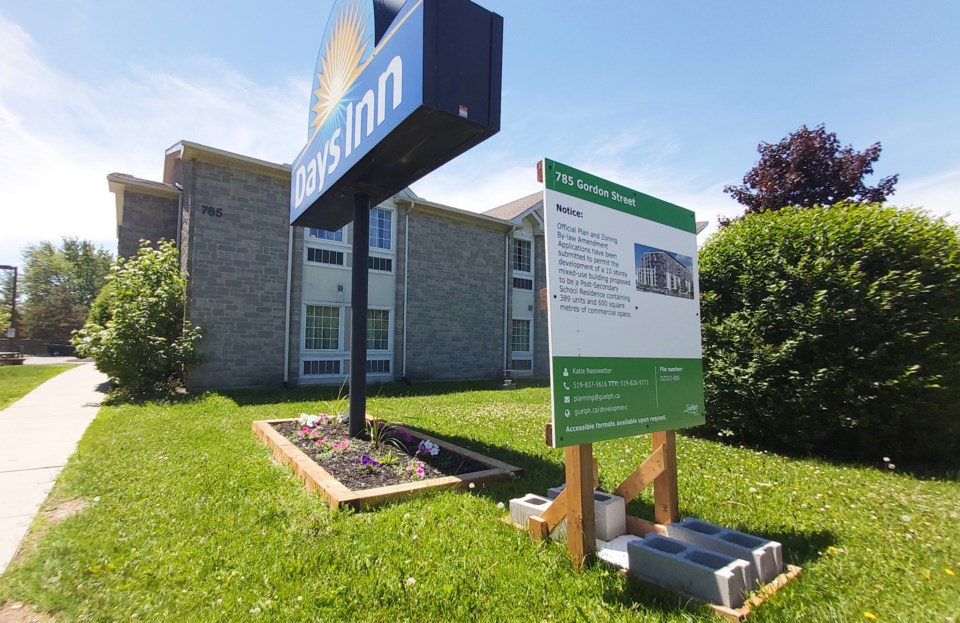Seven households were moved out of the Days Inn earlier this month as the University of Guelph began leasing the hotel for student housing, marking the loss of yet another affordable housing partner in the community.
In June, the hotel was approved to become a temporary student residence for the next three years, as the university contends with an increasing number of students and fewer places for them to live.
Last year, the university was unable to meet the demand for residence, with around 5,150 first-year students applying to live in campus housing and only 4,700 spots.
While they were able to make room for 5,000, that still left 150 students to look for limited off-campus housing. Leasing the Days Inn allowed them to “immediately increase the number of available residence beds for our students,” said director of communications Deirdre Healey.
“Leasing this property has enabled us to accommodate all requests for student residence spaces this year,” she said.
The hotel, however, was already being used to house vulnerable families who would otherwise be homeless.
Since the pandemic hit in 2020, an average of eight to 10 units were consistently being used by housing services, since there is no family shelter in the area, said Lori Richer, housing stability manager for County of Wellington Social Services
But in order for students to move in, those families had to move out.
“When we became aware that the space was being used as housing for vulnerable families, we made it clear that we did not need to take over the property until after suitable alternative accommodations were found for everyone currently living in the property,” Healey said.
“Our priority was to ensure everyone staying in the space had suitable alternative accommodations before taking any action to transform the property into a student residence.”
Richer said they were notified by the Days Inn on June 1 that they would have to be out of the rooms by July 31. At that time, there were six families and one individual living in the units.
Stepping Stone was able to secure housing placements for as many families as possible by the July 31 deadline, and the remaining families were moved to the Silvercreek Temporary Accomodation site, formerly the Holiday Inn Express.
“The impact to the shelter system with this change is that we lost an affordable partner and will be paying much higher rates to support families at other locations,” Richer said. “Our community has lost quite a few hotels and affordable rental units and this loss is very concerning especially with a housing crisis.”
Many of those were hotels, which the county typically utilizes for vulnerable families who would be homeless otherwise, since there is no dedicated family shelter, she said.
The former Holiday Inn they were using on Scottsdale was renovated into student housing, Richer said, and the Royal Brock Hotel was torn down for renovations.
Several affordable buildings have also burned down in the last few years, including the building on Wyndham Street, which had 14 units, and the apartment complex in Mount Forest, which had eight units.
Most recently, the 90 Carden apartments were sold to a new owner, and tenants living in the 50 units have left or being evicted.
“Another aspect of the affordable unit loss is that when a unit turns over either by eviction or someone moving, the new rent that is charged is market rent,” Richer said. “The unit may have previously rented at $1,000/month and is now re-renting at $1,800-2,200/month.”
More affordable housing is desperately needed, and to maintain that stock, she said, more non-profit, co-op and government funded affordable housing options need to be developed, with investment from all levels of government.
Mike Moffatt, PLACE Centre founding director at Smart Prosperity Institute, who recently published a report on the solutions to the housing crisis, agrees.
“There is certainly not enough housing. And what used to be affordable housing is oftentimes going back onto the market, then getting converted into market rate housing.”
He said one of the big challenges at the moment is that there are different groups, like students and those in need of supportive housing, “being put in the position where they’re all having to compete with each other for a limited amount of space.”
“It’s highly problematic, and the only way we’re going to be able to address that is to substantially increase the amount of housing across Ontario.”
The way to do that is multi-pronged, he said.
“For example, there is a lack of on-campus student housing. That can be addressed through joint financing programs between the federal government, provincial Government and the higher education sector.”
He added it’s important to recognize “that this is a really complicated problem. There's no one cause of it. So we need a whole suite of policies.”
